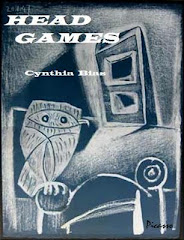“Took you long enough,” Marchand said. "The word I used was 'now.' Why the rush?”
“Small town traffic. Get this,” Williams said and hurried to the deskside chair, “you won’t believe the crazy mess we found. That place is a madhouse, and the techs. are up to their ears w--"
“In a minute. Check it out.” From the paper bag on the floor Marchand pulled out a plastic evidence bag. Inside was a black book. He grinned.
“Unsealed. Convenient.” Williams reached into his jacket pocket for fresh latex gloves. He handed them over.
“More than five years of games--we deserve the first good look. It’s a diary. 1998.”
“Hot damn!” He jumped up. “A confession?”
“I'd say we’re about to find out. And you, Detective, owe me a Scotch, a double, for the wait.” With care Marchand leafed through the Donovan diary. “Might as well start with those happy holidays…”
***
...Late Christmas Eve. I’ll never forget it. But doing something, anything, since then has helped to deal with it, so I write. And I write because every time I read this, I’ll remind myself that there can be not one more stupid mistake. Not ever.
To ignore caution, though, went beyond stupid. Neither of them could be trusted, I knew that. It started the second I saw my suitcase. Only she would do that, and no way could she miss my diary. And no way in this hell would she resist looking, spying, prying into the only thing closest to me and all mine, and then she would tell. Him first, then others, and they would ruin my life, make it more miserable than it is. It wasn’t my fault.
When I saw that suitcase my life changed. The room changed, but, my God, mere words may not describe it. Without warning came that fear and a vague thought about her. Then I was filled with the sense that everything was different while in every way the same. It was incredible. It was the raw reality of unreality, now I know, yet then all I could do was stare, because the four walls around me weren’t a simple bedroom but a vast--boundless--other space.
It was an enveloping universe somehow pervading my own, one I’d been blind to before but existed all along. I could feel it mocking me, my stupidity. And the light. Every inch of that universe was bathed in a brilliance, I thought, until I realized there was not the slightest speck of shadow. The fabric of that space was the light, and with reason, for some profound purpose.
Even so, the more I stared the more confused I became, and the more afraid, because in that brilliance every object looked less than real, as mere hints of things, but at the same time exceeded real as indisputable beings, alive, entities whose true essences and intentions I was expected to know without question, but had never seen, and couldn’t understand then because of my ignorance, so they mocked me, everything, and cruelest of all was my suitcase.
That it lay open just so meant something. A message. But in my confusion I could only doubt, so the suitcase mocked me...it grew brighter then less, larger then smaller, nearer then far...and my fear exploded. I heard a whoosh like rushing wind while a fiery pain sliced through my neck. Behind my eyes was an excruciating pressure. It swelled and swelled until I (my mind? self? soul?) shot out my head.
Hovering before me in the brilliance was me, and staring back, astonished. Next, the suitcase blasted me with a blinding blackness of utter terror, evil, and when again I could see, I saw my other me but less--myself less blasted away bits. Left behind in these essential gaps was nothing. No light, no fear, no pain. No one. I was getting it. Because I was ignorant and dared to doubt, the threat against me was more humiliation and annihilation. My escape from that hellish universe would be earned...or not. I would do my very, very best to understand the message of the suitcase.
I’d rather die than go crazy again.
So I spoke to it, my other self, too--the sweater is here and not there, the pants left to right, isn’t all as it should be? Then a man’s voice boomed. “Look!” One word, yet its meanings were clear and real, brilliant. I looked. I understood. And when at last I believed, that terror vanished. In its place was agonizing rage. And a lifetime of hate. So I listened to the voice--choice was not an option--and did what I had to do to protect myself, my future and my mind.
It wasn’t my fault. For two days a freakish apprehension had been growing until not even a drink would curb it anymore. It was her fault for not minding her own damned business and daring to read my diary. Mom messed up, and Dad shares the blame for making this family as pathetic as it is. And despite the days and weeks to come, what misery could surpass those living miseries from my past?
But enough already. This day’s been intense, to say the least. For now all I want is to unwind, and maybe to sleep, and to bury this nightmare for the night...
Unpublished work © 2010 Cynthia Bias
+(3)+(Custom).jpg)
.bmp)